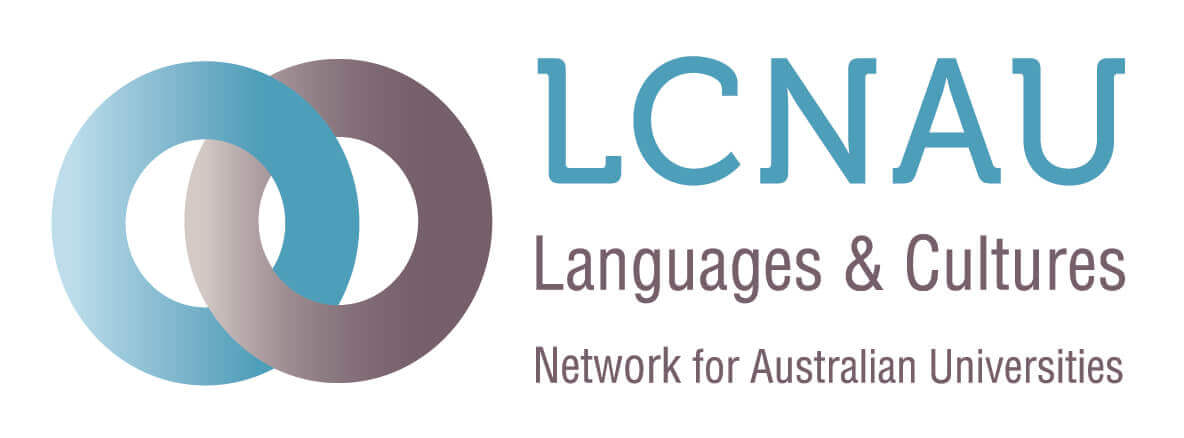About us
LCNAU is a network that brings together individuals, language programs, university structures and tertiary institutions. It aims to strengthen the tertiary languages sector in Australia through advocacy, collaboration, research and support.
LCNAU provides a vital link across the languages sector, by enabling increased systematic and regular collaboration and exchange. Leadership and guidance are urgently needed at various levels, from tutor to professor. LCNAU also strives to meet the need for leadership around models of delivery, models of assessment and curriculum development; this is underpinned by LCNAU’s goal of providing the most effective and rewarding learning experience for students.
LCNAU also functions as a lobby group for language education, something which has been sorely lacking. It contributes to challenging and changing public attitudes, which constitute an ongoing obstacle to achieving language education policy goals. LCNAU also interacts productively with other education sectors (primary and secondary), with business, and with other stakeholders.
The Languages and Cultures Network for Australian Universities therefore aims to provide the best possible languages education for Australian students by:
- supporting and extending sector cooperation, between Arts and Education faculties, and between universities;
- sharing present and future good practice across Australian universities;
- offering support on models of delivery to institutions struggling to keep languages afloat;
- improving the professional development of early-career and mid-career academics;
- encouraging and enabling university research on and through languages other than English; and
- providing a national approach and coordinated voice for the advocacy and promotion of language and culture education within and beyond universities, that is clearly embedded in the tertiary sector and durable over time.
Aims
The Committee 2022-2024
President: John Hajek, University of Melbourne
Immediate Past President: Jean Fornasiero, University of Adelaide
Secretary: Giuseppe D’Orazzi, University of Melbourne
Acting Treasurer: Jean Fornasiero, University of Adelaide
Web Officer: Nicola Fraschini, University of Melbourne
Publications Officer (LCNAU Studies): Xiaoping Gao, University of Wollongong
Newsletters: Kerry Mullan, RMIT University
Minutes Secretary: Nicola Fraschini, University of Melbourne
Committee members: Rob Amery, University of Adelaide; Adriana Diaz, University of Queensland; Kayoko Enomoto, University of Adelaide
It is with deep sadness that LCNAU announces that one of its most distinguished and greatly loved and respected members has passed away following a long illness. As members of an association that benefitted greatly from Colin’s outstanding leadership—a leadership characterised in equal measure by its strong sense of direction and its warmth, wit, […]
Initial support for this website was provided by the Australian Government Office for Learning and Teaching. The views on this website do not necessarily reflect the views of the Australian Government Office for Learning and Teaching.
Incorporated Association Rules
LCNAU, as an Incorporated Association, has adopted a set of Rules. These may be viewed here.
Association Principles
The following set of Principles underpins the goals and activities of LCNAU.
- LCNAU embraces the principle of collegiality, and fosters coordinated communication among University languages and cultures academic staff – sessional, contractual and tenured, junior and senior.
- LCNAU embraces the principles of diversity and inclusion, and the responsibility of promoting and defending them throughout the tertiary sector: it stands in particular for the recognition of the strategic importance of linguistic and cultural diversity within individual institutions and for Australia as a nation. It acknowledges the value of each individual language and culture, and it promotes the greatest possible availability, in Australian universities of a wide range of Australian, Asian, European and World languages. It believes that all students in Australian universities should be able to include the study of languages and cultures in their tertiary experience.
- LCNAU embraces the principles that tertiary languages and cultures programs constitute a distinctive and important academic discipline and that continuing research is an inalienable dimension of the maintenance and development of the discipline in Australian universities.
- LCNAU embraces the principle that languages and culture programs, because of their own inherent interdisciplinarity, are well-placed to engage in broad interdisciplinary teaching and research across universities.
- LCNAU embraces the principle of coherence, in languages programs, of language and culture. It fosters systematic review, reflection and monitoring of improvements in program design and pedagogy for university languages programs, and provides a nation-wide focus for continuous sharing of good practice.
- LCNAU embraces the principle that student pathways to in-depth study of languages and cultures should be readily available, including through in-country study, so that students can attain high levels of expertise of their field of study, including through higher research degrees; and that students at university should be able to build on knowledge of languages and cultures acquired at school /and or at home.
- LCNAU embraces the principle of collaboration with language and culture programs in schools and with teacher education institutions, particularly in relation to policy work and program articulation.
- LCNAU embraces the principles of outreach to other organizations and networks involved in languages and cultures, in order to share information, experience of good practice, new developments and research.
Please follow the link below to a page on which we include links to associations and organisations representing languages and language professionals, as well as to languages and cultures programs.
